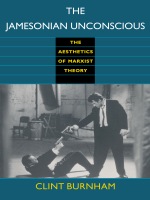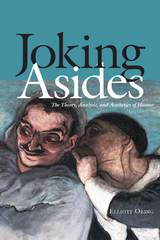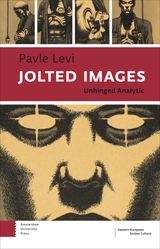543 books about Aesthetics and 4
start with J
543 books about Aesthetics and 4
543 books about Aesthetics
4 start with J start with J
4 start with J start with J

The Jamesonian Unconscious
The Aesthetics of Marxist Theory
Clint Burnham
Duke University Press, 1995
Imagine Fredric Jameson—the world’s foremost Marxist critic—kidnapped and taken on a joyride through the cultural ephemera, generational hype, and Cold War fallout of our post-post-contemporary landscape. In The Jamesonian Unconscious, a book as joyful as it is critical and insightful, Clint Burnham devises unexpected encounters between Jameson and alternative rock groups, new movies, and subcultures. At the same time, Burnham offers an extraordinary analysis of Jameson’s work and career that refines and extends his most important themes.
In an unusual biographical move, Burnham negotiates Jameson’s major works—including Marxism and Form, The Political Unconscious, and Postmodernism, or, The Cultural Logic of Late Capitalism—by way of his own working-class, queer-ish, Gen-X background and sensibility. Thus Burnham’s study draws upon an immense range of references familiar to the MTV generation, including Reservoir Dogs, theorists Slavoj Zizek and Pierre Bourdieu, The Satanic Verses, Language poetry, the collapse of state communism in Eastern Europe, and the indie band Killdozer. In the process, Burnham addresses such Jamesonian questions as how to imagine the future, the role of utopianism in capitalist culture, and the continuing relevance of Marxist theory.
Through its redefinition of Jameson’s work and compelling reading of the political present, The Jamesonian Unconscious defines the leading edge of Marxist theory. Written in a style by turns conversational, playful, and academic, this book will appeal to students and scholars of Marxism, critical theory, aesthetics, narratology, and cultural studies, as well as the wide circle of readers who have felt and understood Jameson’s influence.
In an unusual biographical move, Burnham negotiates Jameson’s major works—including Marxism and Form, The Political Unconscious, and Postmodernism, or, The Cultural Logic of Late Capitalism—by way of his own working-class, queer-ish, Gen-X background and sensibility. Thus Burnham’s study draws upon an immense range of references familiar to the MTV generation, including Reservoir Dogs, theorists Slavoj Zizek and Pierre Bourdieu, The Satanic Verses, Language poetry, the collapse of state communism in Eastern Europe, and the indie band Killdozer. In the process, Burnham addresses such Jamesonian questions as how to imagine the future, the role of utopianism in capitalist culture, and the continuing relevance of Marxist theory.
Through its redefinition of Jameson’s work and compelling reading of the political present, The Jamesonian Unconscious defines the leading edge of Marxist theory. Written in a style by turns conversational, playful, and academic, this book will appeal to students and scholars of Marxism, critical theory, aesthetics, narratology, and cultural studies, as well as the wide circle of readers who have felt and understood Jameson’s influence.
[more]

The Jewish Decadence
Jews and the Aesthetics of Modernity
Jonathan Freedman
University of Chicago Press, 2021
As Jewish writers, artists, and intellectuals made their way into Western European and Anglo-American cultural centers, they encountered a society obsessed with decadence. An avant-garde movement characterized by self-consciously artificial art and literature, philosophic pessimism, and an interest in nonnormative sexualities, decadence was also a smear, whereby Jews were viewed as the source of social and cultural decline. In The Jewish Decadence, Jonathan Freedman argues that Jewish engagement with decadence played a major role in the emergence of modernism and the making of Jewish culture from the 1870s to the present.
The first to tell this sweeping story, Freedman demonstrates the centrality of decadence to the aesthetics of modernity and its inextricability from Jewishness. Freedman recounts a series of diverse and surprising episodes that he insists do not belong solely to the past, but instead reveal that the identification of Jewishness with decadence persists today.
The first to tell this sweeping story, Freedman demonstrates the centrality of decadence to the aesthetics of modernity and its inextricability from Jewishness. Freedman recounts a series of diverse and surprising episodes that he insists do not belong solely to the past, but instead reveal that the identification of Jewishness with decadence persists today.
[more]

Joking Asides
The Theory, Analysis, and Aesthetics of Humor
Elliott Oring
Utah State University Press, 2016
Nothing in the understanding of humor is as simple as it might seem. In Joking Asides, Elliott Oring confronts the problems of humor, analyzing the key contemporary approaches to its study and addressing controversial topics with new empirical data and insights.
A folklorist drawn to the study of humor, Oring developed his formulation of “appropriate incongruity” as a frame to understand what jokes must do to produce humor. He tests appropriate incongruity against other major positions in the field, including the general theory of verbal humor, conceptual integration theory, benign violation theory, and false-belief theory. Oring draws on the work of scholars from several disciplines—anthropology, folklore, philosophy, psychology, linguistics, and literature—to ask basic questions about the construction and evolution of jokes, untangle the matter of who the actual targets of a joke might be, and characterize the artistic qualities of jokes and joke performances.
Although Oring guides the reader through a forest of jokes and joke genres, this is not a joke book. A major work from a major scholar, Joking Asides is a rigorous exploration of theoretical approaches to jokes and their functions and is filled with disquieting questions, penetrating criticisms, and original observations. Written in a clear and accessible style, this book will prove valuable to any scholar or student who takes matters of jokes and joking seriously.
A folklorist drawn to the study of humor, Oring developed his formulation of “appropriate incongruity” as a frame to understand what jokes must do to produce humor. He tests appropriate incongruity against other major positions in the field, including the general theory of verbal humor, conceptual integration theory, benign violation theory, and false-belief theory. Oring draws on the work of scholars from several disciplines—anthropology, folklore, philosophy, psychology, linguistics, and literature—to ask basic questions about the construction and evolution of jokes, untangle the matter of who the actual targets of a joke might be, and characterize the artistic qualities of jokes and joke performances.
Although Oring guides the reader through a forest of jokes and joke genres, this is not a joke book. A major work from a major scholar, Joking Asides is a rigorous exploration of theoretical approaches to jokes and their functions and is filled with disquieting questions, penetrating criticisms, and original observations. Written in a clear and accessible style, this book will prove valuable to any scholar or student who takes matters of jokes and joking seriously.
[more]

Jolted Images
Unbound Analytic
Pavle Levi
Amsterdam University Press, 2017
Jolted Images brings together a large cast of mainstream and avant-garde cineastes, artists, photographers, comics creators, poets, and more, to reflect on a wide range of phenomena from the realms of cinema and visual culture in the Yugoslav region, broader Europe, and North America. Far from a staid monograph, the book takes a cue from filmmaker Dušan Makavejev, who once wrote that there are times when it is necessary "to jolt art, no matter what the outcome"; to that end, the book infuses its analysis with playful, creative transfiguration of the material at hand.
[more]
READERS
Browse our collection.
PUBLISHERS
See BiblioVault's publisher services.
STUDENT SERVICES
Files for college accessibility offices.
UChicago Accessibility Resources
home | accessibility | search | about | contact us
BiblioVault ® 2001 - 2024
The University of Chicago Press









